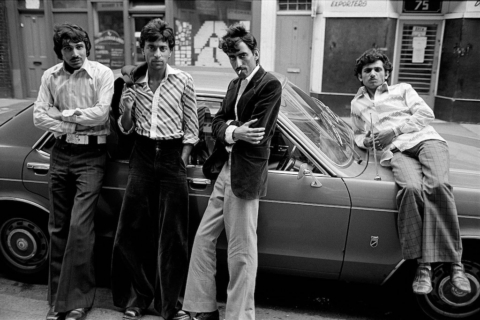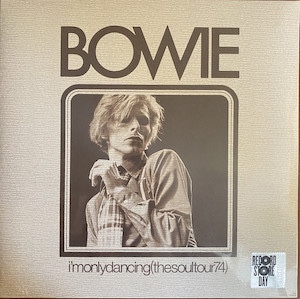Cymande; The Band You Never Knew, You Knew
By Jo Phillips
Sometimes we hear a tune, a melody we recognise, something rings a bell, and we think ‘Yeah I know This Tune’ but in truth, we are not sure who it’s by or when we first heard it. If you love funk, Soul, Hip-Hop, or many other styles of music that fit within the dance realm then the band Cymande’s music will be familiar to you, except you may well not realise it’s them. Truly funky tunes from the early ’70s when dance music was really flying in the USA. So you make think the band is some kind of Rave Groove set up from the States, not a London-based collective, who inspired literally generations of music makers but never had a hit in their own backyard. Find out more in Cymande; The Band You Never Knew, You Knew
If you ever danced at clubs in the 1980s, 1990s, 2000s onwards, then this practically unheard-of band would have influenced more or less every piece of music you moved to, even if it was dancing around your own kitchen.
Cymande, a Black British group from the 1970s, who by rights should have become British Funk superstars, never had any hits or even success in the UK but whose songs did eventually change music history and in particular shape the sound of dance music forever more.
It was the early 70s in the south London areas of Balham and Brixton, a group of Black musicians, who came to the UK from the Caribbean including from Jamaica, Guyana, and St Vincent, and as children, were part of the Windrush generation, formed Cymande (Pronounced Si-Man-Day). Led by Patrick Patterson (guitar) and Steve Scipio (bass) with a common love of rhythms and a message of peace, the band combined jazz, funk, soul and Caribbean grooves to create a new unique sound; music that was political, spiritual, with a dove as their symbol, and who were way ahead of their time.
Their songs encouraged the listener to travel through the development of Black music and the social experience to which it gave voice, and were honed in a rehearsal space in Brixton, as the band refined their skills in the pubs and clubs of the London afro rock and jazz scene.
And it was in a Soho basement club they were discovered by John Schroeder the eminent music producer. He loved what he heard and soon he and the band were working on their first, self-titled album.
Despite finding success in the USA with their first three albums and their hit songs ‘Bra’, ‘Dove’ and ‘The Message’, as well as touring with Al Green and being the first British band to play Harlem’s legendary Apollo, they faced indifference and discrimination at home. And so disillusioned they disbanded in 1975.
Yet, back in the USA, something was stirring. The band had no idea that their first album, and the song Bra in particular, would have such a key role in changing music history.
The band was oblivious to the seismic impact their music was having. Founder members Steve and Patrick studied and practiced law in the UK, whilst Sax player Derek Gibbs turned his back on music altogether, working with electricals. Percussionist Pablo Gonsales spent a lot of time in Jamaica, still playing music and embracing his Rasta faith.
Drummer Sam Kelly and Sax player/flautist Mike ‘Bammi’ Rose stayed in the music business, building impressive careers as session players and touring the world with many big artists, including the likes of Chaka Khan, Robert Plant and Ben E King, Paul Simon, Aswad, Courtney Pine.
Meanwhile, a new form of music was brewing in the South Bronx in the mid-seventies, young DJs like Nicky Siano and Jazzy J were using two decks to extend breaks and keep the party rocking for longer. It was the birth of a new form of music, hip-hop.
And one of the defining songs in the birth of hip-hop was their music Bra. Every DJ worth his salt played it. It was the soundtrack to so many block parties and park jams, and it wasn’t just the kids in the Bronx who got down to Bra’s famous bass break, it became a bonafide club classic in Manhattan and beyond.
In the early eighties London Norman Jay and Jazzie B were influenced by Cymande’s music, Norman Jay was the first DJ to introduce their music to UK dancefloors as part of his ‘rare groove’ (American soul music that was never hits in UK) sets.
But a new award-winning music documentary feature has been released by BFI Distribution and is available in the UK and Ireland in select cinemas, on Blu-ray and BFI Player. It is the whole story of the band called GETTING IT BACK: THE STORY OF CYMANDE
Because of their deeply respected yet underground following the film has brought not just new followers to their music but also the band has reformed. The story of the band told from over 40 years ago to the present day eventually prompted the band to come back to play together again, to rapturous crowds and acclaim including a generation who weren’t even born when the band split up.
Illustrated with archival footage, the story of these unsung heroes is told on screen through new interviews with the original band members filmed over two years. There are tributes from musicians and producers who have been influenced and enthralled by their music, including Mark Ronson, Norman Jay, Jazzie B, Craig Charles, Khruangbin, Loyle Carner, DJ Maseo of De La Soul, Prince Paul, Jim James, Louie Vega, Peanut Butter Wolf and more.
This debut feature film from British director Tim Mackenzie-Smith is a riveting account of what happened to Cymande. He and his team spent two years filming with the original band members, all of them incredible characters with powerful stories to tell. The film also includes numerous interviews with prominent artists in the UK, France, and the USA all of whom have been inspired by them.
By the late eighties, many of those street DJ’s who grew up at the early block parties were now Producers themselves and they hadn’t forgotten Cymande.
These sampling pioneers reworked, remixed, and introduced their music to a whole new generation. Suddenly clubbers around the world started looking for this band’s music in vintage stores and car boots. The British rare groove scene of the mid-80s was a celebration of 60s & 70s underground soul and funk, usually referred to as rare Grooves (the name given by Norman Jaye) Cymande’s songs were a staple fixture in the clubs and on mixtapes. And so that was the beginning of the band ‘coming home’
Regarding this film, the director says
‘I found Cymande in the mid 90s via a mixtape that was circulating around my university. It had no track list, it was just called “Rare Groove” and was a selection of funk and soul. There were two tracks in particular that I loved, but I had no idea who they were by! I assumed they must have been by an American band, and it was only years later that a friend played me Cymande’s first album, and I released it was them!
I then realised that not only were they from the UK but they were from Brixton, just down the road from me. And immediately the questions arose, who were they? Why hadn’t I heard about them? What happened to them?
For years it bothered me. This music, which I loved and my friends loved should have been huge! We spent years telling everyone we could that they should listen to Cymande.
And then in 2017, after years of doing sports documentaries, I was looking for a project with real meaning, to tell an untold story. And it became clear that the story of Cymande was the one. I reached out to Steve and Patrick in July of that year, and a 6 year obsession began. We initially started filming in order to make a teaser to try and tempt investors and commissioners but the material was so good we realised that we had to just keep going, and not be subject to the whims of anyone else. A lot of people thought we were mad, that it was too much of a risk given that they were so unknown. But one way or another, this film had to be made’.
Tim Mackenzie-Smith
And the words of wisdom, from those who work within the dance music arena says so much.
“They were a band for thinkers. Their music isn’t throwaway, it’s thought about, it’s challenging, it confronts you. And it makes you dance.” Norman Jay
“To me Cymande were the British Earth Wind and Fire, they were the black British supergroup that never happened” Craig Charles
“Don’t matter how you slice it and dice it they will definitely go down on the hip hop archives as one of the sacred crates. These are songs that upon which if it wasn’t for songs like these there would have been no hip hop” Jazzy J
“The arc of history bends to the just’ It’s taken over 40 years, but better late than never.” Mark Ronson
“The world needs to know this band. They changed music for me, and if you hear them they’ll change music for you as well. I guarantee it” Wil-Dog Abers
“For them to get that love is so huge. Just to know they didn’t fail, they made some of the most timeless music anyone has ever made” Jim James
“Cymande stands right there as the soundtrack to my life” DJ Maseo
“They had everything against them, but the music was strong enough not to die” Kevin Le Gendre
It’s kind of amazing that it took over 40 years for a group of musicians to be truly recognised in their homeland. This band that affected SO many music-makers is now touring the world again and are being embraced by the internet generation who weren’t even born when the band split up.
A soft stone that sent ripples not just across the pond but around every ocean in the world. Welcome home Cymande
The film had its world premiere at SXSW followed by its UK premiere at the BFI London Film Festival. Cymande will be on tour in support of the film release throughout 2024 including dates in UK, Europe, and Australia. For further details: More Information Here cymandeofficial.com/
If you enjoyed reading Cymande; The Band You Never Knew, You Knew then why not read Jazzing Up London Here









